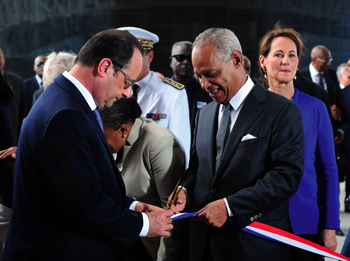French president visits slave memorial in Caribbean museum
By AP | Last updated: May 28, 2015 - 4:04:13 PMWhat's your opinion on this article?
PARIS (AP) - French President Francois Hollande marked the memory of millions of slaves in an inaugural visit to a memorial in the French Caribbean island of Guadeloupe, where Black men and women were sold to work on sugar cane plantations from the 17th to 19th centuries.
The visit revived the debate over the consequences of France’s slave trade in the region. Some angry voices are pushing for France to pay reparations, an issue that President Hollande has thus far avoided.

|
The 77,000 square-foot complex is worth $93 million and has a symbolic black facade, representing the millions of victims of slavery. The permanent exhibition, which is due to open to the public in July, illustrates the history of slavery through hundreds of documents and objects.
Local authorities expect some 150,000 visitors per year to the memorial, which is meant to “contribute toward healing wounds of the past” according to the president of the Regional Council of Guadeloupe, Victorin Lurel.
However, a local organization which began the museum project in 1998 decided not to attend the inauguration to protest against Mr. Hollande’s refusal to discuss the issue of financial reparations.
“What we want is for Hollande to apologize in the name of the French people and for him to look into the reparations issue,” Jacqueline Jacqueray, president of the International Committee of Black People, told The Associated Press.
“Slavery is part of France’s history and France must dare to face its history,” she said.
France’s law has recognized the slave trade and slavery as a crime against humanity since 2001.
In 2013, Mr. Hollande acknowledged the country’s “debt” to Africa because of slave trade and the “baneful role played by France.” But he also said that this history “cannot be the subject of a transaction.”
Last year, leaders of Caribbean nations adopted a broad plan to try to get apologies and reparations from European nations that practiced slavery such as France, Britain and the Netherlands. Caricom, the political grouping of 15 countries and dependencies, has created the Caribbean Reparations Commission to push the issue.
France’s monarchy took possession of some Caribbean islands in the 17th century, and, in 1685, King Louis XIV established the “Code Noir,” a decree that defined the conditions of slavery in the colonial empire.
France abolished slavery in 1848.
INSIDE STORIES AND REVIEWS
-
-
About Harriett ... and the Negro Hollywood Road Show
By Rabiah Muhammad, Guest Columnist » Full Story -
Skepticism greets Jay-Z, NFL talk of inspiring change
By Bryan 18X Crawford and Richard B. Muhammad The Final Call Newspaper @TheFinalCall » Full Story -
The painful problem of Black girls and suicide
By Charlene Muhammad -National Correspondent- » Full Story -
Exploitation of Innocence - Report: Perceptions, policies hurting Black girls
By Charlene Muhammad -National Correspondent- » Full Story -
Big Ballin: Big ideas fuel a father’s Big Baller Brand and brash business sense
By Bryan Crawford -Contributing Writer- » Full Story






 Click Here Stay Connected!
Click Here Stay Connected!








